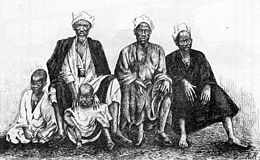Bambara people

Bambara people in upper Sénégal river valley, 1890. (illustration from Colonel Frey's Côte occidentale d'Afrique, 1890, Fig.49 p.87)
|
|
| Total population | |
|---|---|
| (2,700,000 (2005)) | |
| Regions with significant populations | |
| Mali, Guinea, Senegal, Burkina Faso, Niger, Ivory Coast, Mauritania | |
| Languages | |
| Bambara language | |
| Religion | |
| Islam | |
| Related ethnic groups | |
| Mandinka people, Soninke people, Diola, other Mande speaking groups. |
The Bambara (Bambara: Bamana or Banmana) are a Mandé people living in west Africa, primarily in Mali but also in Guinea, Burkina Faso and Senegal. They are considered to be amongst the largest Mandé ethnic groups, and are the dominant Mandé group in Mali, with 80% of the population speaking the Bambara language, regardless of ethnicity.
The Bamana originated as a royal section of the Mandinka people. They are founders of the Mali Empire in the 13th Century. Both Manding and Bambara are part of the Mandé ethnic group, whose earliest known history can be traced back to sites near Tichitt (now subsumed by the Sahara in southern Mauritania), where urban centers began to emerge by as early as 2500 BC. By 250 BC, a Mandé subgroup, the Bozo, founded the city of Djenne. Between 300 AD and 1100 AD, the Soninke Mandé dominated the Western Mali, leading the Ghana Empire. When the Mandé Songhai Empire dissolved after 1600 AD, many Mandé-speaking groups along the upper Niger river basin turned inward. The Bamana appeared again in this milieu with the rise of a Bamana Empire in the 1740s, when the Mali Empire started to crumble around 1559.
While there is little consensus among modern historians and ethnologists as to the origins or meaning of the ethno-linguistic term, references to the name Bambara can be found from the early 18th century. In addition to its general use as a reference to an ethno-linguistic group, Bambara was also used to identify captive Africans who originated in the interior of Africa perhaps from the upper Senegal-Niger region and transported to the Americas via ports on the Senegambian coast. As early as 1730 at the slave-trading post of Gorée, the term Bambara referred simply to slaves who were already in the service of the local elites or French.
...
Wikipedia
